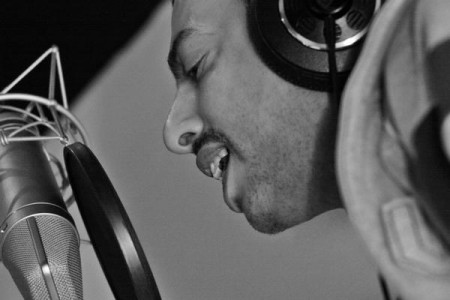Rap on the radio
“If the older generation could hear just one song on the radio, maybe they would love rap.”

This is what rapper AJ Hajaj thinks about the future role of rap in his home country Yemen. AJ Hajaj, who was born and raised in the U.S., first went to Yemen for four months in 1981, after graduating from high school. In the U.S. he worked in various places – including restaurants, companies, and grocery stores – in order to sustain himself. It was only in 1995 that AJ Hajaj decided to return to Yemen in order to find his soul mate and get married. In 1999, he produced his first six-track album entitled Nights in Arabia, followed by four others, the latest one being Beladi, released in 2010.
Can you tell us about the popularity of rap in Yemen?
In some countries, rap has become mainstream, but in Yemen this isn’t the case because radio stations don’t broadcast rap. So people, especially those living in villages, are not listening to rap music. We know that Arabic music has influenced rap because rappers have sampled Arabic music and sounds.
How do fans of rap in the Arab world react to Yemeni rap?
I see that youth admire this music, but that’s not the case with the older generation. But if they could hear just one song on the radio, maybe they would love rap. Some people used to criticise rap and describe it as distasteful art. But after the revolution, people started to respect rap because it was used to express relevant issues.
How did you mix Arabic music and rap?
I became popular in the Arab world and in the U.S. because I mix sounds of the west and the east — this makes fans from both regions happy since they can hear their local music in my mixes.
Can you share with us some lyrics from those mixes?
Kuol ma’aa mustaheel
Kuol ma’aa that’s it, that means “say no”
La lilmaalal la lilfashal la ldhulm
Kyf tkul bduon ma thum
Kul la bdon ihraj bdon ma tzael ahd ya haj
Koul la yumkn tekharjak min mashakl wa sewar yumkn tenasbak
Koul la la takhaf wlesh beaslob adab
Koul la mush aeeb
which means
“Say no”, it’s impossible
“Say no”, that’s what it means, “say no”
No to boredom, no to failure, no to tyranny
How to say “no” with no concern
Say no without being embarrassed, say no without harming anyone
Say no, it may help you to overcome problems
Say no, don’t be afraid, say no with a polite manner
Say no, it’s not a shame
Are there many rappers in Yemen?
Yes, there are many rap singers, most of whom are young. The problem is that they’re not being supported to produce albums. There are no radio stations to broadcast their work.
Who supported you?
I was supported by myself because I was born in the U.S. and I love writing rap; if I had been born in Yemen maybe by now I’d be an Arab poet! The secret behind my success in the U.S. is the mix between Arabic music and English in an unusual way. The Americans love this unconventional combination. Actually, no one supported me in the U.S., but through my participation in a few concerts, I could produce albums for sale in the areas where Arab – especially Yemenis – live. My initial fame came from that. In Yemen, Faris Al-Sanabani, the business manager of the former president of Yemen recently supported the production of my video clip for the 20th edition of the Gulf Cup of Nations.
Can rap singers in Yemen make a living from such an art?
Here, it’s difficult to make a living from rap music. Before the revolution, many rap singers gathered at parties where they played and performed all types of music. But we suspended those parties due to the revolution. Now we have to start again.
How do your foreign fans in Yemen interact with this music?
They encourage us to create high-quality rap music with beautiful words and meaning. They’re happy to see us throw such parties. They want our music to be purposeful and to help solve society’s issues.
Rap music in the region: how can it be developed?
Music in general is not part of the school curriculum, which is a problem. So I think radio stations should support rap by broadcasting it and making it popular.
You’re now working at two radio stations. Tell us about your work there.
At FM Shabab, I produce rap music and songs for several programs. At Yemen FM, I have a one-hour program that broadcasts some rap songs in English.
Finally, what are the ambitions of AJ Hajaj?
Through rap, I hope to help Yemen’s youth and open their future to new possibilities. I hope that they and others will recognise young, talented rappers.
Edited by Laïla von Alvensleben and Stephanie Watt.





